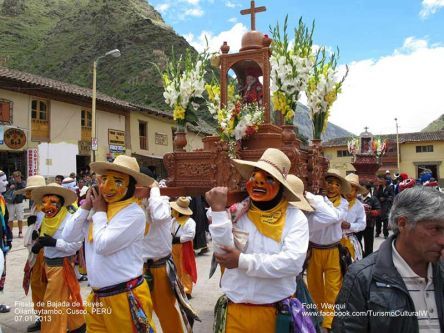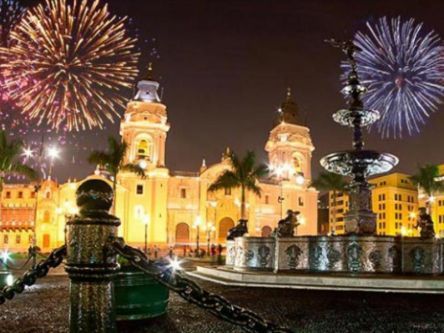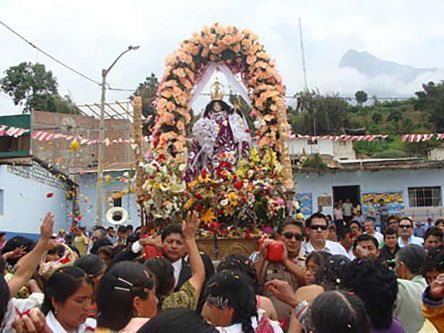Even though readily available -if you know where to look - drugs in the broadest sense are a hot topic in Peru which can easily and quickly get you in lots of trouble and danger. Therefore, before introducing you to the local situation and laws, we recommend best stay away from any illicit substances and people producing, selling, and using them.
Content Overview:
- Coca leaves & Cocaine in Peru
- Ayahuasca, shamanism and healing rituals in Peru
- Medical Marijuana in Peru
- Drug Laws in Peru
- Some final recommendations ...
Coca leaves & Cocaine
Since ancient times, the cultivation of coca leaves (the raw material required to make cocaine) has a cultural and social significance for the indigenous people of Peru. To this day, the stimulant effects of the coca leaf are used for medical purposes and in traditional religious ceremonies.
For these purposes only, the cultivation and usage of coca leaves are legal in Peru. So, chewing coca leaves is legal. The same applies to drinking Mate de coca (coca tea) which is sold on every market and in every supermarket. This tea made from coca leaves can be considered a staple, especially in the Peruvian Andes and is often recommended to travelers to prevent and relieve the symptoms of Altitude Sickness. Legal and available in Peru are also coca flour, coca energy drinks, coca energy bars, coca sweats and chewing gums, which all only use the leaves of the coca plant.
However, please be aware that these in Peru legal products may violate the laws of other countries and be prohibited. Bringing them over the border to other countries might result in hefty fines or even imprisonment for drug possession / smuggling. You should also know that the consumption may result in a positive drug test for cocaine.
On the other hand, you should be aware that cocaine is far away from coca leaves! The production, sale and trafficking of coca paste (paco) and cocaine hydrochloride are illegal in Peru; the possession restricted to a few grams for personal use only (see below under Peruvian Drug Laws).
Persons apprehended with cocaine or other illegal substances will face immediate arrest, long interrogations, and imprisonment for usually 5 up to 15 years, or in worst cases even 25 years, often without being granted remission or extradition to their home country. Having seen the conditions in Peruvian prisons, I’m sure you don’t want to spend there one minute. And as the PNP anti-narcotics unit at the airport, for example, is quite fit and alert, think twice before smuggling anything out of the country or doing someone a favor.
Ayahuasca, shamanism and healing rituals
Peru’s Amazon region is a popular destination for travelers, foreigners, and locals choosing to participate in a shamanic ceremony or healing ritual often based on the consumption of Ayahuasca or other powerful plants and herbs. Being legal and considered part of Peru’s traditional medicine, these unfortunately aren’t without risks.
Unfortunately, in the last few years, the number of unqualified "healers" performing these ceremonies increased immensely. As consuming Ayahuasca and other traditional medicine not only can be a life changing and mind opening experience or heal your mind, body, and soul, but in some cases result in serious illness and even death, we strongly advise to only select established, recommended healing retreats where an experienced shaman accompanies the participants from the beginning to the end.
Please have a medical check-up before participating in Ayahuasca rituals, as the vine not only increases the heart rate and blood pressure but as well causes significant psychological stress.
Medical Marijuana
In November 2017, after a long struggle and persistence of patients, their relatives, and supporters, the Peruvian Congress finally recognized the medicinal properties of cannabis and made the medical and therapeutic usage of marijuana legal in Peru.
The Law 30681 now allows the informed use, research, production, import and sale of cannabis and its derivates, but exclusively for medicinal and therapeutic purposes in accordance with the regulations provided.
To be allowed to buy and use medical marijuana in Peru, patients have to go through a consultation from a registered physician and get his or her authorization. Then they are registered with their personal information, including disease and cannabis treatment plan, which has to be approved by the Peruvian Ministry of Health, in a special database. After that they receive a prescription for the usage of cannabis and/or its derivates for medicinal and therapeutic purposes, which can be filled in authorized pharmacies (in Lima Inkafarma and MiFarma) or cannabis dispensaries.
Be aware that prescriptions from other countries aren’t accepted; they are null and void in Peru. We highly recommend to not cross the border with cannabis or any derivates even though you might be allowed to consume them in your home country.
However, CBD oil, for example, and other healing goodies are sold in some shops without prescription.
Peruvian Drug Laws
Peru has quite extensive and clear laws when it comes to drugs and illicit substances, which can be found in the Peruvian Penal Code. They cover all topics from cultivation, production, trafficking (including forcing others to smuggle), selling and consumption of cocaine, marijuana, opiates, ecstasy, and others.
Most important might be article 299 “Unpunishable Possession” which clearly states which technically illegal drugs can be carried in small quantities for personal and immediate consumption without punishment.
These include:
- 5 grams of cocaine paste
- 2 grams of cocaine hydrochloride
- 8 grams of marijuana or 2 grams of its derivatives
- 1 gram of opium or 200 milligrams of its derivatives
- 250 milligrams of ecstasy, containing MDA, MDMA, Methamphetamine or similar substances
- Cannabis or its derivates for medicinal or therapeutic use in quantities prescribed in the patient's treatment plan and registered with the Peruvian Ministry of Health
However, don’t miss the fine print! Above mentioned quantities are only considered unpunishable if you just have one (1!) substance on you. As soon as you carry two or more different drugs, even below the above-mentioned quantities, you violate Peruvian law. So, if they find a joint and an ecstasy pill on you, you might already be in deep trouble.
Additionally, you should be aware that Peruvian police is quite flexible with the interpretation of the law and even though you only have an unpunishable amount of one drug for personal use on you, you might be considered a potential trafficker, brought to the police station, intimidated, unlawfully detained, and forced to pay a bribe to get out of this unpleasant experience. You don’t want to go there.
Those thinking to participate in drug trafficking, because it's quick and easy money, don't do it. The anti-narcotics unit of the PNP, especially at the airport, is quite professional and well-equipped. Long prison sentences await you, and you should know that Peru's prisons don't meet international standards and mostly are extremely overcrowded. Hygienic conditions and food are on a very low level, supplies with other necessities are difficult and fellow prisoners aren't always well-disposed. A Peruvian prison surely isn’t the place anyone wants to be.
And with Peru being one of the largest cocaine producers in the world and scoring high on the lists of production countries of other drugs as well, cartels are present in certain regions, powerful and anything but squeamish.
With this being said, here some final recommendations:
- Keep your hands off any drugs.
- Don't socialize with people producing, consuming, or selling drugs.
- Have a watchful eye on your luggage and bags, so nobody can hide drugs in them.
- Don't do any favors or try to make a quick buck by taking a package or something similar with you overseas. You might be used as a mule, knowingly or unknowingly.
- Watch out when socializing, especially in bars and discotheques. There have been reports of travelers having a great time in a bar and upon leaving with a new buddy they just had so much fun with, a policeman suddenly stopped them and, strangely enough, found some drugs in their pockets. First, they were threatened with arrest, but soon the cop got very cooperative and offered to let them go if they pay x amount. Out of fear, most people in such a situation pay. But believe it or not, the new buddy planted the drugs and tipped off his friend, the corrupt policeman. If you are in such a situation, you might be happy to pay and get back to your hotel as soon as possible, the other two instead will have a big laugh and share your money.






























